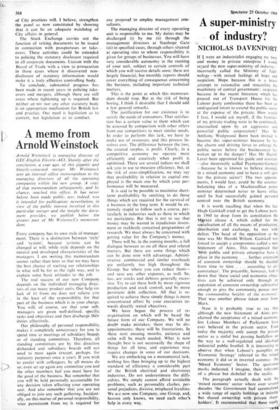A memo from Arnold Weinstock
Arnold Weinstock is managing director of GEC-English Electric-AEI. Shortly after the conclusion, a year ago, of this gigantic and bitterly-contested merger Mr Weinstock sent an internal office memorandum to the managing directors of all the operating companies within the new group. A copy of that memorandum subsequently, and by chance, reached this office. It has never before been made public, nor, indeed, was it intended for publication: nevertheless, in view of the public interest involved in this particular merger and the insight the docu- ment provides, we publish below the greater part of Mr Weinstock's memoran- dum.
Every company has its own style of manage- ment. There is a distinction between 'style' and 'system', because systems can be changed at will, while style depends on the natural and developed characteristics of the managers. I am writing this memorandum sooner rather than later so that we may have the best chance of starting our relationships in what will be for us the right way, and to explain some basic attitudes to the job.
The real success of our new Company-. depends on the individual managing direc- tors of our many product units. Our help (or lack of it) from HQ does not relieve you in the least of the responsibility for that part of the business which is in your charge. You will, of course, see that your sub7 managers are given well-defined, specific tasks and objectives and then discharge their duties effectively.
Our philosophy of personal responsibility, makes it completely unnecessary for you to spend time at meetings of subsidiary boards or of standing committees. Therefore, all standing committees are by this direction disbanded and subsidiary boards will not need to meet again (except, perhaps, for statutory purposes once a year). If you wish to confer with colleagues, by all means do so; even set up again any committee you and the other members feel you must have for the good of the business. But remember that you will be held personally accountable for any decision taken affecting your operating unit. And also remember that you are not obliged to join any such gathering. Incident- ally, on this matter of personal responsibility, lrior permission from Ho is required for any proposal to employ management con- sultants.
The managing director of every operating unit is responsible to me. My duties may be discharged (i) by me (ii) through the management directors at Stanhope Gate- (iii) in specified cases, through others situated at operating sites to whom responsibility is given for groups of businesses. You will have very considerable autonomy in the running of your unit, subject to certain controls of which you will receive details soon; these are largely financial, but monthly reports should cover everything of consequence concerning the business, including important technical matters.
This is the point at which this memoran- dum should stop. But at the risk of being boring, I think it desirable that I should add a few general remarks.
The justification for our existence is to satisfy the needs of consumers. That satisfac- tion has a certain value to them which can be assessed by comparison with other offers from our competitors to meet similar needs. In order to perform this task, we have to make use of resources, and this process in- volves cost. The difference between the two, the created surplus, is profit. Clearly, in a competitive economy we operate most efficiently and creatively when profit is optimised. There are several indices we shall ask you to use to measure efficiency, but, at the risk of over-simplification, we may say that profitability in relation to capital em- ployed is the main one by which your per- formance will be measured.
It is said to be possible to maximise short- term profitability by omitting to do those things which are required for the survival of a business in the long term. It would be ex- tremely stupid to follow such a course, par- ticularly in industries such as those in which we participate. But that is not to say that money may be wasted in injudicious invest- ment or recklessly conceived programmes of research. We must always be concerned with getting value for the Company's money.
There will be, in the coming months, a full dialogue between us on all these and related matters. But there are some things which can be done now with advantage. Admini- strative, commercial and similar overheads are uniformly too high throughout the Group. See where you can reduce them— and save any other expenses, as well. So, too, are stocks and debtors generally exces- sive. Try to cut these both by more rigorous production and stock control, and by more persistent debt collection. All that is re- quired to achieve these simple things is more concentrated effort by your executives to- wards directly stated objectives.
We have begun the process of re- organisation on which will be based the future form of our Company. We will no doubt make mistakes; there may be dis- appointments; there will be frustrations. In these next ensuing months, patience and calm will be much needed. What is now thought best is not necessarily the shape of things for all time, and experience may require changes in some of our decisions.
We are embarking on a monumental task, nothing less than bringing up to the highest standard of efficiency a considerable part of the British electrical and electronics industries. Do not underestimate the diffi- culties. We simply cannot afford avoidable problems, such as personality clashes, per- sonal prejudices, divisive, misplaced loyalties. We are now one Company, one Group, and, heaven only knows, we need each other's help in every way.


















































 Previous page
Previous page